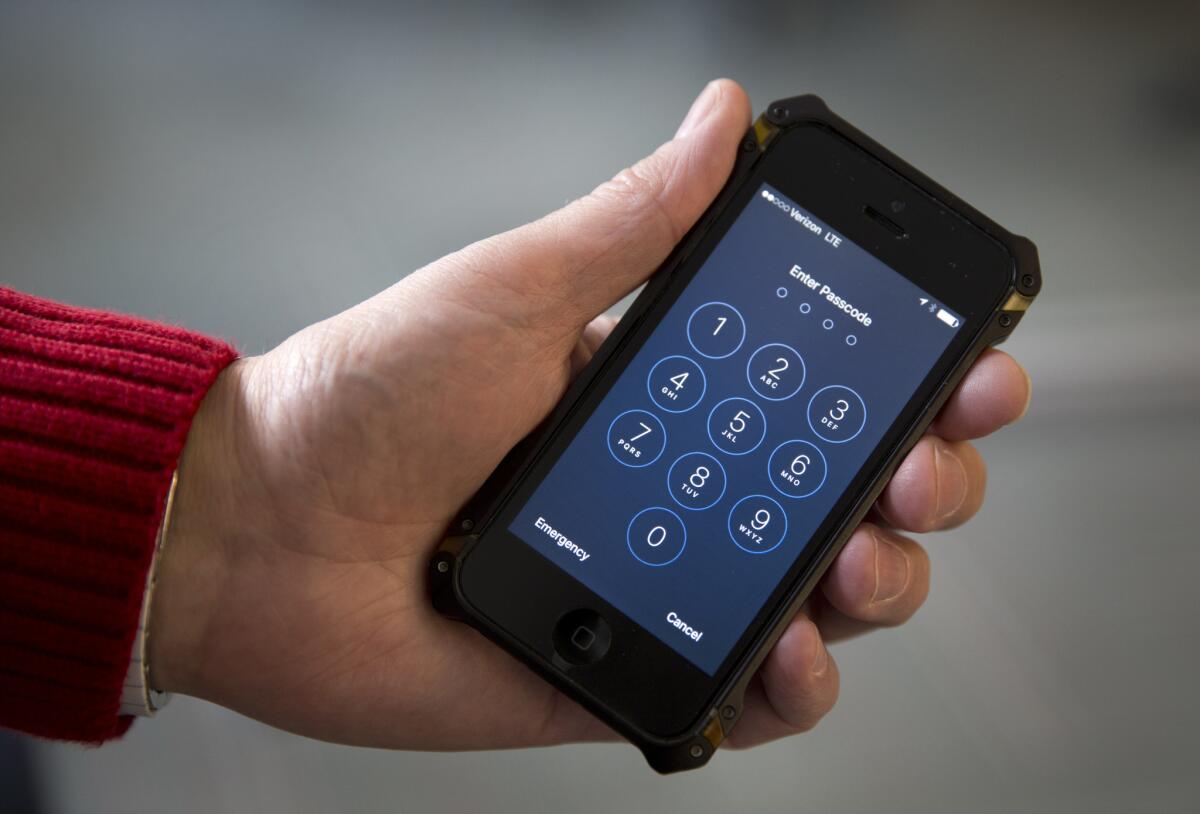FBI-Apple case: Why did feds suddenly cancel a big hearing? Here are 5 theories

A four-digit passcode on an iPhone 5c has foiled the FBI from fully investigating the San Bernardino terrorism investigation.
- Share via
A federal court on Monday signed off on the Justice Department's request to cancel a major hearing in a months-long battle with Apple Inc. over obtaining personal data from the iPhone of one of the San Bernardino shooters.
Prosecutors said the government needed time to test "a possible method for unlocking [Syed Rizwan] Farook’s iPhone" that they received from "an outside party" on Sunday. If they deem the method works -- and can ensure it won't damage the smartphone's memory -- it would no longer need Apple's help in the San Bernardino case. The FBI must provide a status update by April 5.
FULL COVERAGE: Apple's fight with the FBI >>
So what gives?
The general public and cybersecurity experts have been throwing ideas the FBI's way for several weeks, and experts said it's unlikely that someone devised a new technical workaround at the last moment. Could there be more to the 11th-hour postponement than the Justice Department is saying?
Here are some theories.
The FBI is giving the ACLU's method a try -- at last.
Daniel Kahn Gillmor, a technology fellow at the ACLU, laid out two weeks ago what's considered among the most plausible ways to unlock Farook's iPhone 5c. The phone is guarded by a four-digit passcode, but the FBI bears the risk of making the contents of the device permanently inaccessible if it incorrectly guesses the passcode too many times.
Gillmor suggested the FBI could copy a special portion of the phone's memory that counts the number of passcode entries. Constantly restoring the copy could get the agency around the limit on guesses.
The ACLU said Gillmor's method, or some variation of it, might be the one the FBI is considering. If true, it suggests that the FBI "either doesn't understand the technology well enough or wasn't telling us the full truth earlier when it said that only Apple could break into the phone," ACLU staff attorney Alex Abdo said in a statement.
"Either possibility is disconcerting," he said.
See the most-read stories this hour >>
The FBI is bluffing because it needs more time -- or wants the case to die down.
Members of the Obama administration quietly have expressed reservation about the case against Apple, according to reports. Meanwhile, other federal agencies including the Department of Defense don't want to see encryption technology weakened.
Polls show Americans remain divided on the issue -- suggesting the FBI has not yet won over the general public.
Add to those concerns the last-minute cancelation and there's fodder for conspiracy theorists to wonder whether the FBI might be backing down in what has been an acrimonious battle with the world's most valuable company by market capitalization.
The NSA stepped in.
FBI Director James Comey told Congress that his investigators exhausted every possible idea they had to get help from other government agencies, including the National Security Agency. When it comes to computer hacking, experts say the NSA is years ahead of the FBI.
Fearing the court would rule against the FBI, perhaps Comey made one last plea for help to the NSA -- and came away with the goods.
There's no publicly known vulnerability to disable the core security on the iOS 9 operating system that's installed on Farook's phone, but top hackers say the NSA is one of the few organizations in the world that would have its hands on such software if it were to exist.
Join the conversation on Facebook >>
Apple tipped off the FBI.
Apple attorneys said Monday that they have no idea what the FBI got its hands on and didn't offer any guesses. The company also declined to say whether it has investigated the feasibility of the ACLU method or any other iPhone hacking ideas raised in recent weeks. But given Apple's desire to fix all threats to the security of its products, it makes sense the company would be among the first to know of any flaws.
If Apple found a loophole that unlocked a phone without requiring company engineers to do the government's bidding, it may have reason to share it with the FBI. Doing so could remove the pressure from the case while ensuring there is no legal precedent allowing authorities to force Apple to unravel its own security measures in future investigations.
Such a tip could come voluntarily through Apple employees or an intermediaries.
John McAfee, or someone like him, cracked the iPhone.
Coming up with a new hacking tool in such a high-profile case would be a remarkable feat for any hacker -- one that could warrant bragging rights, future job opportunities and perhaps a hefty consulting fee from the FBI.
Difficult as it may be, hackers who spend their time looking for these types of vulnerabilities have good reason to concentrate entirely on this case.
John McAfee, a pioneering entrepreneur in computer security who has a history of making bold claims, has already said he can decrypt the phone if given the chance. He didn't immediately respond to a request for comment.
The Justice Department didn't name the outside party but said it's "cautiously optimistic" about the idea.
Twitter: @peard33
ALSO
For law enforcement, there is no single profile of a self-radicalized jihadist
Islamic State claims responsibility for Brussels attacks; at least 31 dead
FBI says it might be able to unlock San Bernardino terrorist's iPhone without Apple's help




